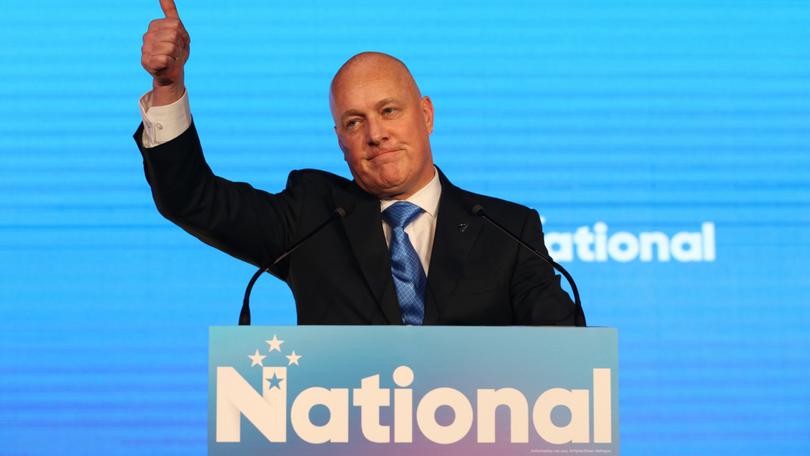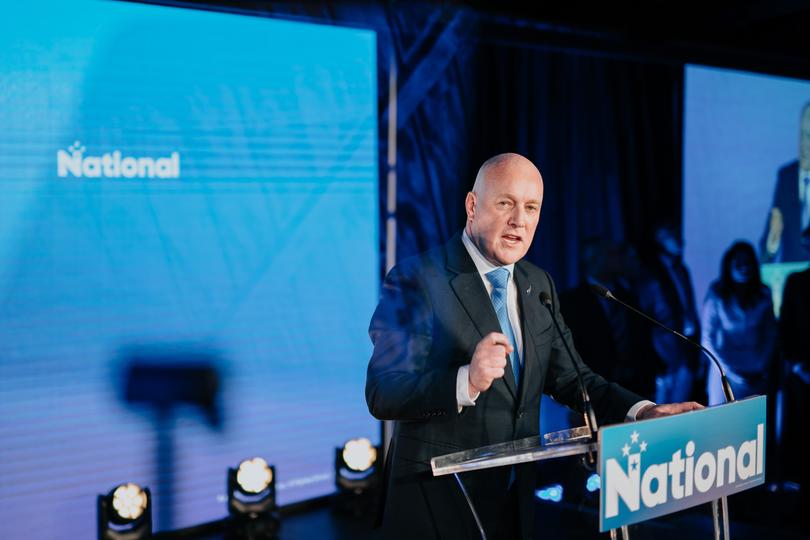New Zealand stands up to China: Kiwi PM Christopher Luxon says stance won’t spark Beijing backlash
New Zealand’s Prime Minister Christopher Luxon says he is confident that standing up to China won’t trigger a hostile backlash from Beijing like the one Australia experienced in recent years.

New Zealand’s Prime Minister Christopher Luxon says he is confident that standing up to China won’t trigger a hostile backlash from Beijing like the economic coercion Australian winemakers and barley growers experienced.
In an exclusive interview with The Nightly, Mr Luxon said that although he was keen for his country to contribute to developing new weapons with Australia, the US and UK, AUKUS was undefined and that New Zealand was still far from understanding what contribution it could make to the project.
New Zealand has a long-standing opposition to nuclear power and nuclear weapons and has in the past preferred to define itself as of the Pacific.
Sign up to The Nightly's newsletters.
Get the first look at the digital newspaper, curated daily stories and breaking headlines delivered to your inbox.
By continuing you agree to our Terms and Privacy Policy.But it has begun describing itself as part of the Indo-Pacific and backed the plan for Australia to acquire nuclear-powered submarines from the UK and US to try and help contain Chinese aggression and dominance of key trading routes.
“We think AUKUS is actually a good thing for regional security and stability in the Indo-Pacific,” Prime Minister Luxon said in an interview.
“So we’re comfortable with AUKUS, we think it’s entirely appropriate.
“We ourselves are going through a reset of our foreign policy and we have done it immediately and that is essentially saying, ‘Look, the world as it once was, the world as it is today is quite different and we have to be quite clear-eyed about all of that’.
“We live in the Indo-Pacific region, it is a big focus for us where our national interests actually sit and our national interests are both security and economic and those two issues are increasingly interdependent.”
New Zealand and China forged diplomatic relations 52 years ago with New Zealand the first country to strike a free trade agreement with Beijing.
Like Australia, it also has a huge economic dependency on China and for almost the last decade, China has been New Zealand’s largest customer, buying 27 per cent of the country’s total exports last year, according to Stats NZ.
Mr Luxon said while there remained “huge opportunities” for New Zealand to continue trading with China, working on climate change and promoting the flow of tourists and international students, there were issues when it came to doing business with the world’s second-largest economy.
He cited China’s economic slowdown and demographic challenges, which include China’s ageing and falling population.
“Equally we acknowledge we have different histories, different values, different political systems and we will predictably, consistently, publicly and privately talk to those differences because we have a set of values and we have differences — we should be able to express those,” the prime minister said.
“And so that’s where you’ve seen us recently publicly attribute cyber attacks from China and we’ll call that out publicly.
“You’ve seen us — in a broader sense — stand up for international rule of law.”
Asked if he believed he could continue to stand up to China without inviting the economic coercion the Chinese Communist Party dealt out to Australia during the pandemic with huge tariffs on barley, wine and a range of other goods, Mr Luxon said: “I think we can manage it.”
China regularly criticises such rebukes as interfering in its internal affairs.
But this week China’s Ambassador Wang Xiaolong told New Zealand that joining AUKUS military programs would be akin to “choosing sides” and warned that the China-New Zealand relationship was at a “critical juncture.”
Mr Luxon said while New Zealand was keen to contribute to helping develop new weapons, the AUKUS countries were still getting to grips with the project themselves.
“Well that’s exactly what we want to understand and I have to be honest and say that Pillar II AUKUS has been pretty undefined and thrown around as something,” he said.

“It actually needs to be very well-defined and it hasn’t been and frankly the AUKUS countries have only really been in a position in recent weeks, frankly, to actually entertain engaging, exploring, what it could mean and what it could be.
“We want to be a force multiplier and we want to be interoperable with Australia in a defence sense.”
Bryce Wakefield, CEO of the Australian Institute for International Affairs said the shift to embrace the Indo-Pacific was significant.
“Ardern did acknowledge the concept, but always in the context of New Zealand’s traditional perception of itself as a Pacific nation,” Dr Wakefield said.
But he doubted that New Zealand would ever be as robust as Australia when it came to identifying specific Chinese aggressions.
“New Zealand has been less gung-ho than Australia in calling out China by name on, say, maritime territorial issues, with Wellington stressing legal principles rather than Beijing’s specific transgressions,” he said.
“I don’t see that changing much.”
And he said that New Zealand may struggle to bring much to the AUKUS table.
“The obligations and benefits around Pillar II are still quite vague, but it’s fairly clear at the moment that partners will need to bring advanced know-how or funding to the table,” he said.
“New Zealand might find that difficult in many of Pillar II’s focus areas.”

